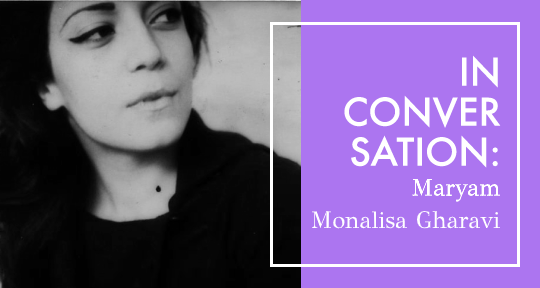Maryam Monalisa Gharavi is an artist working across mediums, from poetry and translation to net art, film, theory, and performance. Her work explores the relationship between politics, aesthetics, and phenomenology, with a particular focus on the vacillating potential of the internet as a public and personal space, equal parts diary and mechanism of empire. I first encountered her work in Algavarias: Echo Chamber (Ugly Duckling Presse, 2016), a translation of Syrian-Brazilian poet Waly Salomão. Gharavi renders Salomão’s “poems of ideal architecture” in all their immense complexity, as humorous as they are solemn, as splintered as they are universal.
Serena Solin (SS): Something that intrigued me throughout Algaravias: Echo Chamber was the fragmentation of image. I’m thinking particularly of this quote from the poem “CARIOCA STREET 1993”: “clippings, replicas, reshowings, free samples, clots without blood, prostheses of the fantasmagoric Soap Street.” Virtual realities and “handycams” are also represented. As a contemporary artist, is fragmentation or reflection across multiple screens something you think about? Do you believe there is now, or ever was, an unbroken space for art?
Maryam Monalisa Gharavi (MMG): I think that Waly Salomão was certainly ahead of his time in writing that poem in the early nineties. Naming a poem “.doc” before we had AOL and Hotmail accounts is especially interesting for an artist in South America who was attuned to the burgeoning virtuality of how we see each other and ourselves.
One of the things I’ve been doing under quarantine is watching period dramas. If I were just living my ordinary, non-quarantine life, I wouldn’t be watching Vanity Fair and The Age of Innocence, but it’s fascinating to think about the idea that there was ever a time when the whole could be contained. We have a fantasy of ourselves as contemporaries, being post-everything, and to some extent there may be truth to that; our tools have shaped us to be different than Martin Scorcese’s characters. But watching period dramas and experiencing a different visual repertoire from my own, I’m struck by how much virtuality and narrativizing of lives and selves there was in the eighteenth and nineteenth centuries. Maybe we as contemporaries are so hungry for control that we have an impulse to find containers for everything. I think control is part of the artistic impulse, as well as a directive under quarantine—to not lose your mind, to think about the very few things within your control. I don’t know that I can draw a ready line to virtuality, but often our tools give us that sense of control. At the same time they are not just tools; they shape us.
SS: With regard to period dramas, I thought quarantine might be a good time to read Anna Karenina for the first time, and I was enthralled by the way the plot is reflected through characters who weren’t actually present for an event but heard about it from someone else—in other words, gossip as narrative style. Perhaps the conclusion is that there’s nothing new under the sun—not virtuality, not narrative fragmentation.
MMG: Anna Karenina was actually on TV the other day, dubbed into Portuguese, a real experience. Postmodernism is maybe the most boring topic ever, but the first thing to be given that word in literary theory was that moment in Mrs. Dalloway when multiple spectators are watching an airplane. That refractory self and the breakdown of representative, directive viewership is where postmodernism starts to exist historically. But I think we can go further back, and wider culturally.
At the same time, I think we are living something different. I live in the time of Uber. It’s significant that we know the technology we rely on is working when it’s most erased, which is profoundly interesting and understudied—we would have to give more attention to that to fully understand ourselves. READ MORE…

